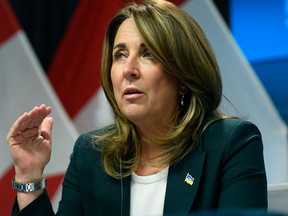Wages key to pace of Bank of Canada’s remaining rate hikes

Climbing wages run risk of entrenched inflation, warns deputy Carolyn Rogers

Article content
Wages appear set to determine the pace at which the Bank of Canada raises interest rates over the rest of the year.
Advertisement 2
Story continues below
Article content
Bank of Canada senior deputy governor Carolyn Rogers said last week that the central bank is wary of a wage-price spiral, as workers take advantage of a record level of job vacancies to insist on salary increases that match this year’s spike in the cost of living. That could cause inflation to become entrenched, as employers likely would seek to recoup higher labour costs by charging more for goods and services.
Article content
Following a Sept. 8 economic speech in Calgary, Rogers described the labour market as tight, contributing to the central bank’s determination that demand has exceeded the economy’s ability to keep up with orders. That’s fuelling inflation, which clocked in at an annual rate of 7.6 per cent in July, slower than the previous month, but still well above the Bank of Canada’s two-per-cent target.
Advertisement 3
Story continues below
Article content
Workers are “looking at the rate of inflation and what it’s doing to their purchasing power, their budgets, and they’re looking at the same tight labour markets and they’re thinking ‘I need a raise,’” Rogers told reporters.
Rogers’ remarks came a day after the Bank of Canada opted to raise its benchmark rate by three quarters of a percentage point, the second consecutive supersized increase after July’s one-percentage-point hike. Tiff Macklem, the governor, has said one of the reasons that he’s raising interest rates so quickly is to keep those expectations from taking root, betting that whatever pain is caused now will be less than what would be required to crush inflation if households and businesses lose faith in the two-per-cent target.
Advertisement 4
Story continues below
Article content
“Entrenchment” of inflation expectations “would be damaging to the economy,” Rogers said.
Still, Rogers emphasized that it was not the central bank’s place to provide advice on setting wages. That point of emphasis followed controversial comments by Macklem earlier this summer that were interpreted by some union leaders as encouraging employers to suppress wages.
“As a business, don’t plan on the current rate of inflation staying,” Macklem said in a July 14 question-and-answer session hosted by the Canadian Federation of Independent Business. “Don’t build that into longer-term contracts. Don’t build that into wage contracts. It is going to take some time, but you can be confident that inflation will come down.”
Advertisement 5
Story continues below
Article content
Another interpretation was that Macklem was simply urging his audience to believe him when he says the Bank of Canada will do what is necessary to get inflation under control, even if that means courting a recession.
-

Bank of Canada’s Carolyn Rogers says inflation won’t come down overnight
-

Bank of Canada raises rate 75 bps and signals more hikes to come
There are signs the economy is slowing. The labour market loosened somewhat in August, as the Canadian economy lost 40,000 jobs, which caused the unemployment rate to rise to 5.4 per cent, a far cry from the 15,000 job gain that Bay Street economists were expecting.
The monthly decline was the third in a row, which tends to be indicative of a downturn, according to Royce Mendes, an economist at Desjardins Group. However, Mendes added that the average hourly wage rate rose 5.6 per cent from August 2021, which was a faster pace than analysts expected.
“We’ll be watching wages closely,” Rogers said. “What we need is that supply and demand to come back in balance across the economy and particularly in labour markets. That’ll take the pressure off wages.”
• Email: [email protected] | Twitter: StephHughes95
Advertisement
Story continues below







